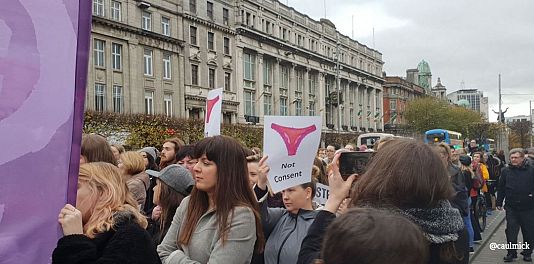f
The treatment of a 17-year-old complainant in a rape trial sparked fury in Ireland and set off reverberations across the world last week.
 ADVERTISEMENT
ADVERTISEMENT
 ADVERTISEMENT
ADVERTISEMENT
The acquitted defendant's lawyer asked the jury to take note of the underwear the teenager was wearing on the night of the alleged incident.
In her closing argument, the defence lawyer, Elizabeth O'Connell, urged the jury to "look at the way she was dressed," on the night prosecutors said the teenager was raped in an alleyway, according to the Irish Examiner.
"She was wearing a thong with a lace front...Does the evidence out rule the possibility that she was attracted to the defendant and was open to meeting someone and being with someone," O'Connell asked.
Masses of people took to the streets in protest of the comments across Ireland with participants waving lace underwear in retaliation. The lawyer's conflation of the type of underwear a woman chooses to wear with rape ignited rage and yet again sparked a public discussion on consent in Irish society.
Irish Minister Ruth Coppinger took to the Irish Parliament and presented a lacy thong to the sitting politicians.
"How do you think a rape victim or a woman feels at the incongruous setting of her underwear being shown in the courts," Coppinger asked.
Euronews' Rengin Arslan interviewed the Irish Minister on her reaction to the trial and her subsequent retaliation in Irish Parliament.
How did you hear about the rape case and what the barrister said in the court?
Coppinger said that although the trial hit international headlines, prior to the comments made in the defence lawyers closing argument "it wasn't widely reported". Reading the newspaper, Coppinger was "angry that these arguments are still being used in courts to try to suggest that what you wear and particularly your underwear has any bearing on whether or not you are being raped".
Coppinger noted the wide social media campaign that then ensued. Women across the country began to share images of underwear and thongs with the hashtag "this is not consent". "So we decided, we had leaders questions in the parliament. We are a small party. The timing was on our side and we decided to do this on this issue. Because the socialist party has been associated with issues related to woman rights," she said.
"So we, myself and my colleagues, agreed on this. So the discourse would be display underwear and we did this way because we have to be very careful not to make it a joke or something. I decided to do it in a certain way to highlight the fact that it is completely out of order for underwear to be in the court and to be in the parliament as well".
What was the reaction in Irish Parliament after you showed the underwear? What was the atmosphere like in there?
The atmosphere inside the Irish Parliament was "very strange," Coppinger said, highlighting the silence reverberating through the chamber. "The chairperson rang the bell and tried to say that you are not allowed to display anything in the parliament, you are not hold up a sign, poster. But I don't accept these parliamentary niceties when there is a massive problem about the violence against women in the society and I brought it in. But also to show the absurdity of somebody who wears these underwears being used against them," she said.
"But there was a silence and even the Taoiseach [Prime Minister] was very uncomfortable and it was very difficult for them to attack us for doing this. Because they knew the strength of the feeling in the society and their failure to adequately deal with the whole issue," she said.
Why did you feel angry?
"How I felt was very angry that yet again this rape myth is being used in court as part of a campaign to discourage us, a woman who has the bravery and the stamina to take a case that far. Because of the extremely difficult to pursue a prosecution for rape even in so-called developed countries like Europe where it is often there is a two-year delay between the attack and the case coming to court."
Coppinger said that there are "a lot of barriers" in bringing a rape case to trial. "The case can be dropped by the director of public prosecutions. There a lot of things that can happen and then when you get to the court the idea of that what you are wearing can be used – this is an argument from 40 years ago- and this is still being brought up despite #metoo, despite all we had managed in Ireland".
When asked whether her gesture and the subsequent rallies in Ireland could be a turning point or a milestone for Irish women's history, Coppinger replied: "obviously this is what I hope but I can't predict how this is going to unfold".











